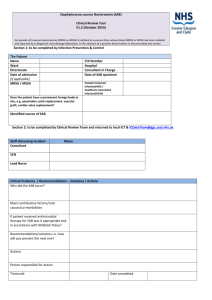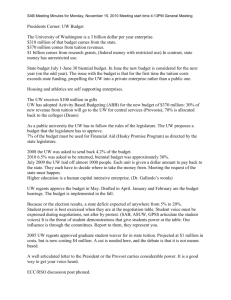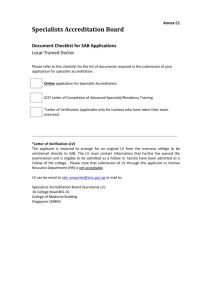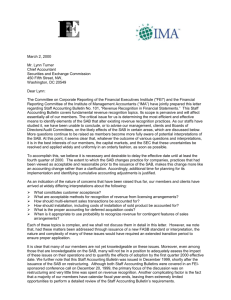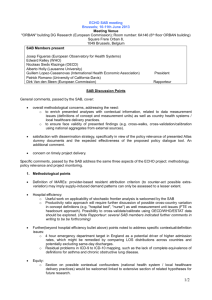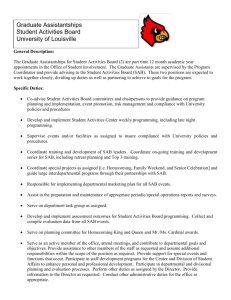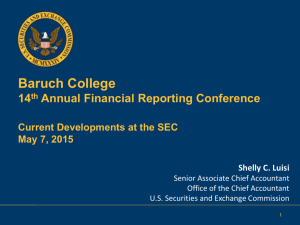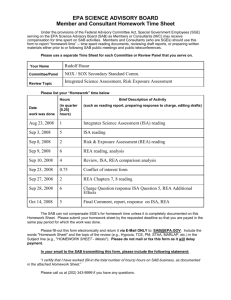MATH-ESE 3D Math in the REAL World
advertisement
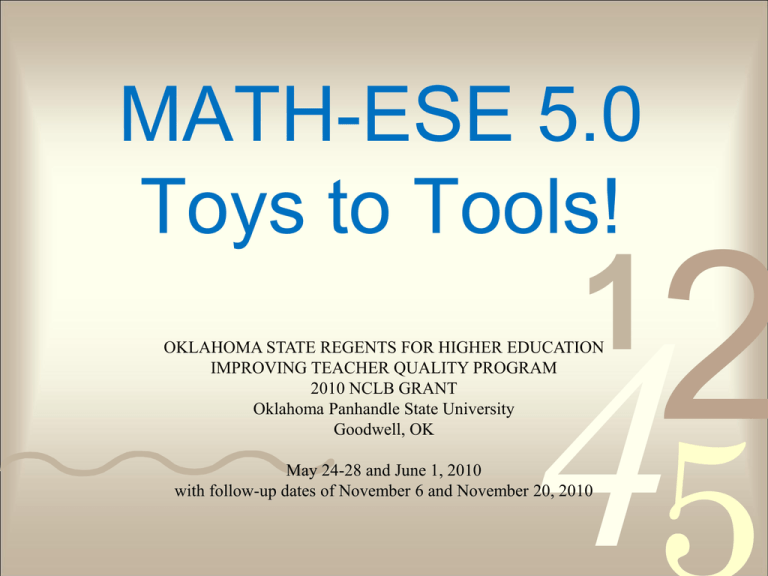
MATH-ESE 5.0 Toys to Tools! 1 2 4 OKLAHOMA STATE REGENTS FOR HIGHER EDUCATION IMPROVING TEACHER QUALITY PROGRAM 2010 NCLB GRANT Oklahoma Panhandle State University Goodwell, OK May 24-28 and June 1, 2010 with follow-up dates of November 6 and November 20, 2010 Introductions Shawna Lyle Jana Peterson Jerry Mihelic Elaina Stewart Nancy Roberts Dave O’Sullivan Maggie Cline Pre-Test Background • Students in the public schools are more involved with technology than ever before. • Over 250 million Americans now subscribe to a cellular-phone service—82.4%. • Quadrupled from 1997. • Almost all children in the U.S. have access to a mobile device. Background • Mobile device ownership ages 4-14 doubled since 2005. • 54% of 8-to-12-year-olds will have cell phones within the next three years. • More than 10% of 4- and 5-year-olds use a cell phone. Background • Among students, more than half said they would "use technology more easily at school if they could use their own laptop, cell phone or mobile device to work on projects, access related software applications and the Internet, and communicate with classmates." (Cell phone ownership was reported by 67% of high school students and 52% of middle school students.) Background • Among students, more than half said they would "use technology more easily at school if they could use their own laptop, cell phone or mobile device to work on projects, access related software applications and the Internet, and communicate with classmates." (Cell phone ownership was reported by 67% of high school students and 52% of middle school students.) Background Therefore: This is the year when social networking-not the laptop-will emerge as the learning tool for the class room. Focus of this workshop • Math-Ese 5.0 will seek to address these challenges and will concentrate on the use of, and training in, the emerging technology available to mathematics teachers and students. – Additional areas of focus include Information Literacy and Evaluating Websites – Math Content—Multiplication and its Connection to Other Math Areas as well as beyond the Math Classroom – Library Visit to View Math Books Objectives Participants will 1. develop higher-level knowledge of making connections to mathematics, 2. develop higher-level knowledge of Information Literacy as it applies to mathematics, 3. develop strategies for recognizing and using connections among mathematics ideas, Objectives 4. develop strategies for recognizing and applying mathematics in contexts outside of mathematics 5. create assessment instruments to measure the increase of student mathematical knowledge, 6. analyze student achievement data and increase their reflective practices to improve instructional strategies, Objectives 7. develop presentations using technology tools to communicate mathematical connections in their classrooms that they will share with peers, and 8. the professional development strategies, specific workshop activities, and participant findings will be shared with other Oklahoma school districts. Objectives • All students in the schools of the participating teachers will show improvement in their ability to comprehend mathematical connections appropriate to their grade level as measured by a teacher made pre-post test. • Director of the seminar will compile and share results of the project through presentations and publications as well as publishing the information on the “Tool Kit” web site. Benefits of the Workshop • Lesson plans aligned to P.A.S.S. • Increased ability to analyze students’ achievement data • Training in the use of Social Networking tools for the teaching of mathematics Benefits of the Workshop • • • • • Laptop computer iPod Break-out sessions Networking Stipends Necessary Information & Requirements • • • • • Lunch Breaks Bathrooms Copies Printing Necessary Information & Requirements • • • • • • Attendance Daily Reflection Lesson Plan Pre/Post Tests TWS report Presentations Schedule • • • • May 24th-28th and June 1st Follow up dates: Nov. 6th and Nov. 20th May 24-27 meetings—9:00AM-5:00PM May 28 and June 1 meetings—9:00AM4:00PM • All sessions will be held on OPSU Campus Detailed Schedule • • • • • • • Today—Tuesday, May 24th Orientation and Requirements Concept Map Pre-Test Math-ESE 5.0 Pre-Test (multiplication) Lunch Orientation of Laptop and iPod Daily Evaluation and Journaling Detailed Schedule • • • • • Tuesday, May 25th Information Literacy and Evaluating Websites Lunch Computer and iPod Troubleshooting Math Content—Multiplication and its Connection to Other Math Areas as well as beyond the Math Classroom • Daily Evaluation and Journaling Detailed Schedule • Wednesday, May 26th • Morning Break-out Sessions • 9:00am-Noon – Elementary On-Line Websites—Jana Peterson—SAB 210 – Microsoft Math, Winplot, Geogebra—Shawna Lyle—SAB 211 – Communication Platforms—Blogs, Wikis, Ning, etc.—Elaina Stewart—SAB 104 – SmartBoard for Novices—Nancy Roberts—SAB 101 • Lunch Detailed Schedule • Wednesday, May 26th • Afternoon Break-out Sessions • 1:00-4:00pm – Elementary On-Line Websites—Jana Peterson—SAB 210 – Microsoft Math, Winplot, Geogebra—Shawna Lyle—SAB 211 – Skype—Dave O’Sullivan—SAB 104 – SmartBoard for Novices—Nancy Roberts—SAB 101 • 4:00-5:00—Discussion and Daily Evaluations—SAB 101 Detailed Schedule • Thursday, May 27th • Morning Break-out Sessions • 9:00am-Noon – Graph Club Software—Jana Peterson—SAB 210 – Web Quests—Jerry Mihelic—SAB 103 – Communication Platforms—Blogs, Wikis, Ning, etc.—Elaina Stewart—SAB 104 – SmartBoard for Intermediates—Nancy Roberts—SAB 101 • Lunch Detailed Schedule • Thursday, May 27th • Afternoon Break-out Sessions • 1:00-3:00pm – Web Quests—Jerry Mihelic—SAB 103 – Graphing Calculators—CBL/CBRS—Shawna Lyle— SAB 211 – Skype—Dave O’Sullivan—SAB 104 – SmartBoard for Intermediates—Nancy Roberts—SAB 101 • 4:00-5:00—Discussion and Daily Evaluations—SAB 101 Detailed Schedule • Friday, May 28th • • • • • 9:00-10:00am—Post Test 10:00-Noon—Library Visit Lunch 1:00-3:00pm—Individual Work Session 3:00-4:00—Discussion and Daily Evaluations—SAB 101 Detailed Schedule • Tuesday, June 1st • 9:00-Noon--Participants’ presentation of their proposed math lesson including technology, social networking, Skype, etc., planned pre/post test, and other information • Lunch • 1:00-3:00-- Participants’ presentation of their proposed math lesson including technology, social networking, Skype, etc., planned pre/post test, and other information(continued) • 3:00-4:00—Evaluation and Journaling Follow-up Dates • November 6th and November 20th—HMH 127 • Presentation of Lesson Plan, pre/post test, data, TWS material, social networking, Skype, other technology used, etc. • All materials must be uploaded to the Math-Ese 5 Wiki at least one week prior to date of presentation – Including Lesson Plan (following prescribed format), pre/post tests, pre/post test scores (on excel form), TWS data (submitted online to OTCA), links to other social networking sites, etc. Contact Information R. Wayne Stewart rwstewart@opsu.edu Phone 580.349.1408 mathese5.pbworks.com
